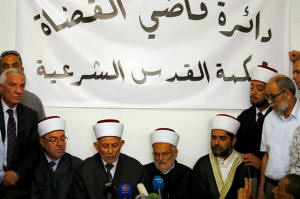|
Muslim elders urge return to prayer as
Israel backs down over Al-Aqsa
 Send a link to a friend
Send a link to a friend
 [July 27, 2017]
By Luke Baker and Ali Sawafta [July 27, 2017]
By Luke Baker and Ali Sawafta
JERUSALEM (Reuters) - Muslim elders urged
worshippers to return to pray at Al-Aqsa Mosque in Jerusalem on Thursday
after Israel backed down in the face of 10 days of often-violent
protests and removed all security measures it had installed at the site.
Israel's decision marks a significant climbdown by Benjamin Netanyahu's
government and comes after days of diplomatic effort by the United
Nations, the involvement of President Donald Trump's Middle East envoy
and pressure from countries in the region including Turkey, Saudi Arabia
and Jordan.
The dispute began after Israel installed metal detectors, cameras and
steel barriers at Muslim entrances to Al-Aqsa compound, also known to
Muslims as the Noble Sanctuary, following the July 14 killing of two
Israeli policemen by Arab gunmen who had concealed weapons there.
The extra security provoked days of unrest, with violent clashes on the
streets of East Jerusalem. Israeli forces shot and killed four
Palestinians in the fighting, and a Palestinian man stabbed and killed
three Israelis in their home.
Most Muslims have refused to enter the compound for the past two weeks,
instead praying in the streets around the Old City.
But Muslim elders declared themselves satisfied that Israeli authorities
had reverted to how security was before July 14.

"The technical report showed that all obstacles the occupation (Israel)
put outside Al-Aqsa mosque were removed," said Abdel-Azeem Salhab, the
head of the Waqf, the Jordanian-funded trust that oversees Jerusalem's
Muslim holy sites.
"We praise this stand in the past two weeks outside Al-Aqsa and we want
this stand to continue outside Al-Aqsa and now inside Al-Aqsa," he said,
urging worshippers to return to pray.
Palestinian political factions issued statements supporting the Waqf
announcement, which may help quell the unrest. Before the announcement,
factions had been calling for a "day of rage" on Friday, which would
probably have fueled the violence.
Jordan, which signed a peace treaty with Israel in 1994 and has been
custodian of holy sites in Jerusalem since 1924, said Israel's removal
of the security measures were an "essential step to calm the situation".
Saudi Arabia said King Salman had been in contact with the United States
and other world powers to try to defuse the tensions and had "stressed
the need for the return of calm". It called for respect for the sanctity
of the compound.
"King Salman bin Abdulaziz al-Saud, has held contacts with many world
leaders over the past few days," an announcement from the Saudi royal
court, published by state news agency SPA, said.
[to top of second column] |

Muslim elders speak during a news conference regarding Israel's
removal of security measures at al-Aqsa compound, in Jerusalem July
27, 2017. REUTERS/Muammar Awad

MULTI-FACETED DISPUTE
Palestinian political factions were quick to highlight what they saw
as a victory over Israel, with Netanyahu regarded as having backed
down. A spokesman for Netanyahu declined to comment on the decision,
but the right-wing criticized him.
"Israel is emerging weakened from this crisis, to my regret," said
Education Minister Naftali Bennett, whose right-wing faction is in
Netanyahu's coalition and is a potential challenger for the
leadership.
"The truth must be stated. Instead of bolstering our sovereignty in
Jerusalem, a message was relayed that our sovereignty can be
shaken," he said.
Netanyahu had insisted that the extra security was needed to ensure
safety at the site, which is also popular with tourists. But by
taking the steps to bolster security, Israel was materially changing
the sensitive status quo, which has governed movement and religious
practice for decades.
The Noble Sanctuary contains Al-Aqsa Mosque, the third holiest
shrine in Islam, and the golden Dome of the Rock. The area, which
sits on a tree-lined marble plateau in the heart of the Old City, is
also holy in Judaism, as the site of two ancient temples and is
referred to by Jews as Temple Mount.
The dispute, like many in the Holy Land, is about more than security
devices, taking in issues of sovereignty, religious freedom,
occupation and Palestinian nationalism.
Israel captured East Jerusalem, including the Old City and the holy
compound, in the 1967 Middle East war. It annexed the area and
declared it part of its "indivisible capital".
That has never been recognized internationally, with the United
Nations and others regarding East Jerusalem as occupied by Israel
and maintain that the status of the city can only be determined
through negotiations between the parties.
Palestinians do not recognize Israel's authority in East Jerusalem,
which they want as the capital of a future Palestinian state, and
are extremely sensitive to the presence of Israeli security forces
in and around the Noble Sanctuary.
(Additional reporting by Ori Lewis in Jerusalem and Nidal
al-Mughrabi in Gaza; Writing by Luke Baker; Editing by Louise
Ireland)
[© 2017 Thomson Reuters. All rights
reserved.]
Copyright 2017 Reuters. All rights reserved. This material may not be published,
broadcast, rewritten or redistributed.
 |